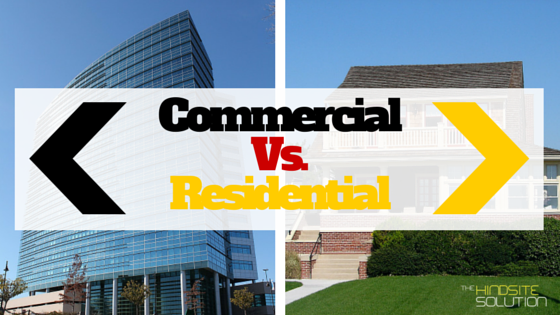
You’ve decided you want to start a lawn maintenance business. Now what?
One of the first items to consider is who to target in your new business. Essentially, that means are you going to target residential properties, commercial properties or both?
Realistically, you most likely want to start with one or the other, not both. Part of the decision may depend on your market. Where’s the competition? Is it good competition? Are there a lot of upper-middle class housing developments nearby? Is there an area with a high density of commercial properties?
In addition to answering those questions, you’ll also want to consider the pros and cons of each. Here are some considerations:
Residential Properties - Pros
Equipment - Servicing a residential property typically doesn’t require expensive equipment. You don’t need the most advanced zero-turn mower or even a 61” deck. Typically, with residential properties, you’re only mowing a lawn, so you can get started with a simple lawn mower. Doing so eliminates early debt in your business and makes your odds of success much better.
Easy to bid - Right out of the shoot you’re probably not going to have perfected your estimating/bidding process. Which is good for residential properties because, typically, they are a lot easier to bid. Plus, it’s easy to produce mass bids. Tools like Go iLawn can give you exact measurements, helping you construct a bid and then mass mail it to your list of targeted residential properties.
Easier to market - I personally think you have a lot more lawn maintenance marketing options when you choose to market to residential properties. Door hangers, targeted mail drops, and even word of mouth is easier when targeting a residential business.
Easier to win business - Typically, it’s easier to win residential business than commercial. Commercial properties may have less competition, but the competition is typically more experienced and has better equipment. Plus, in a typical commercial sale, you may need to sell multiple people - the local property manager as well as their boss at corporate, for example. With a residential sale, you’re usually only dealing with one or two property owners, which makes the sale less complex.
Residential Properties - Cons
More competition - I know this may be a bit contradictory given I just said it’s easier to win business, but there is more competition in the residential space. Based purely on volume, there are going to be more folks vying for the same business as you.
Less revenue per customer - Simply from a revenue perspective, you’ll make less revenue for every residential customer. You may be more profitable, but if your goals are to grow your business quickly to $250,000, it’s going to take a lot of residential customers to get there. There’s just not as much revenue in each residential customer as a commercial customer.
More likely to see you as a commodity - Homeowners may be more likely to compare you to other vendors based solely on price. Their work is simpler - just mow my lawn. What other attributes can they use to compare vendors than price? As a result, price sometimes becomes the most important buying criteria, which means underbidding could kill your growth.
Commercial Properties - Pros
More revenue per customer - I’ve already discussed this point, but it’s worth repeating: commercial properties typically generate more revenue than residential properties. If you choose to target commercial properties and you can pick up a significant number of customers early, you should be able to grow your revenue faster than you could targeting residential properties.
One sale to a property management group can = significant revenue - Related to that point, if you can make a single sale to property management group with multiple properties in your territory, you’ll make a significant amount of money. As a result, you can now only lower your cost per sale, but also leverage that additional revenue to add equipment, people or invest in more marketing.
Cold calling works - If you love to visit commercial properties, walk in, and sell property managers on your business, commercial may be your niche. Commercial businesses are easier to sell using cold calling techniques because they’re typically on the property during business hours. It’s easy to stop in and have a conversation.
Commercial Properties - Cons
Better competition - The competition you’ll encounter in a commercial opportunity is typically better than what you’ll find in residential, primarily because they need to be. Commercial buyers are much less likely to buy from a guy with lawn mower in his rusty old pickup truck. They may even overpay for a business they trust. If you’re new to lawn maintenance, you’re likely to encounter competition with better equipment, more experience and more refined bidding and estimating.
Estimating/bidding needs to be more precise - Speaking of bidding and estimating, if you’re selling to commercial properties, you’re going to want to have more precise bidding and estimating. Not only will your peers know their numbers better than residential providers, but they’ll also potentially have better equipment, which means they may be able to price a property accurately - and still maintain their target profit margin.
Could require larger equipment - If you want to compete in the commercial market, you’ll need to invest in better equipment. That could be larger, more efficient mowers, or it could be more specialized equipment for additional services the commercial property requires.
May need to perform more services - If you want to keep a commercial property long-term, odds are you’re going to have to learn to do more than just mow a lawn. You’ll need to add mulch, plant flower beds, trim trees, fix irrigation systems and more. You may need more highly trained employees and equipment, which all cost money.
Losing one large revenue customer could cost you a significant portion of your revenue - I said earlier that selling just one large property management company could jump start your revenue. The flip side of that? Losing one large customer could force you to downsize your business. Unlike residential, where most customers generate roughly the same amount of revenue, losing a large commercial client will more significantly impact your business.
Conclusion
If you want to grow fast, commercial properties may be your target. If you want to take on less debt and grow more slowly, residential properties are most likely best. Mixing the two may work, but could dilute your brand message and cause a lack of focus that delays growth.
Now that you’ve figured out who your target is, why not investigate which software to use to more efficiently manage your business? Download our Lawn Maintenance Software Buyer’s Guide to learn how to shop for lawn maintenance software.








